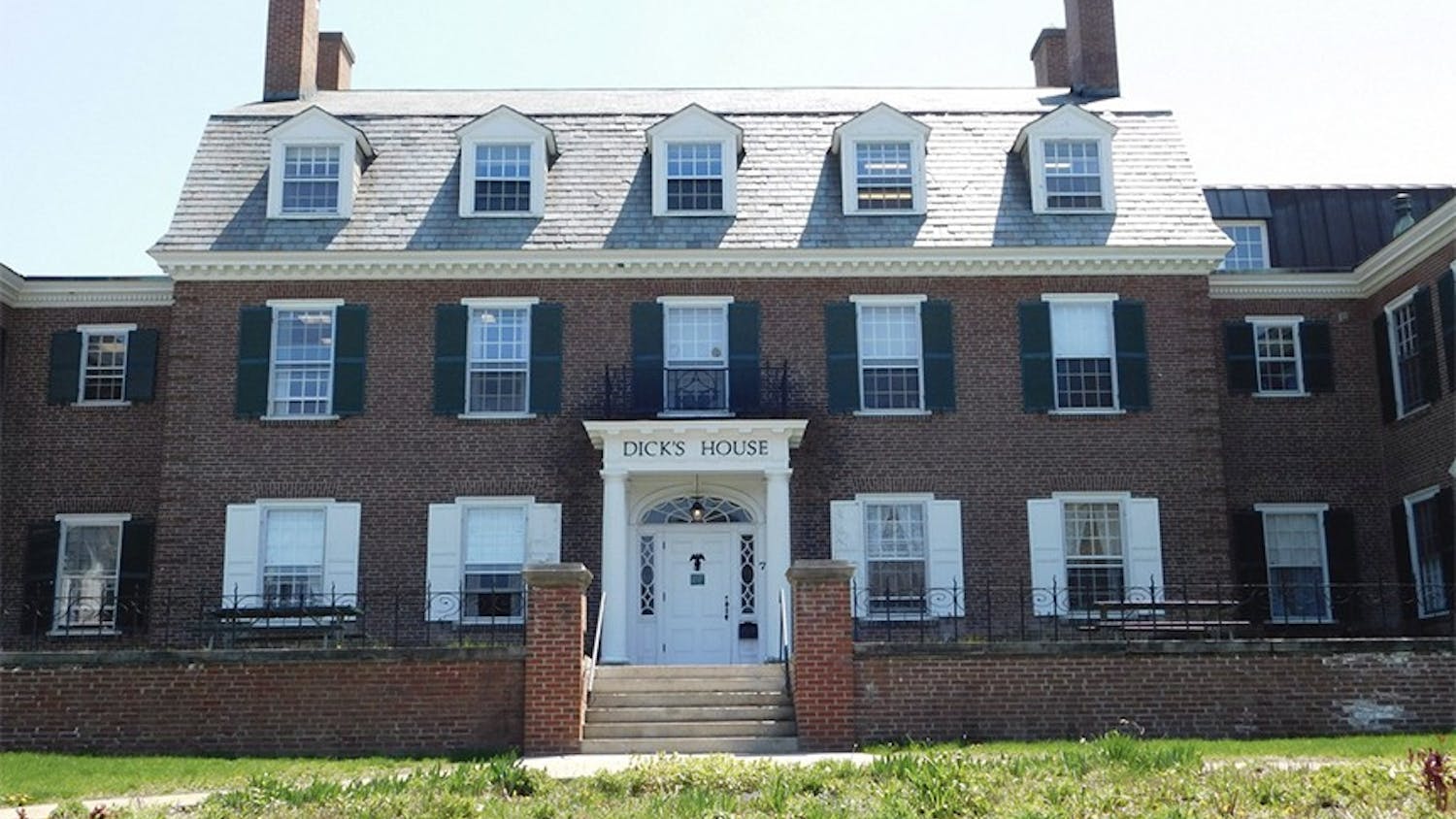In response to the recent exposure of members of the Dartmouth community to novel coronavirus, the College is grappling with how to manage and respond to the virus and its potential risks to more individuals. At the same time, students and community members are dealing with the reality of possible changes to everyday life.
In a campus-wide update sent out yesterday afternoon, Geisel School of Medicine professor and dean for global health Lisa Adams MED ’90 and vice president for institutional projects Josh Keniston — who are co-chairing a task force to manage possible disruptions related to the coronavirus outbreak — announced that a Tuck School of Business graduate student had been experiencing “flu-like symptoms” after attending an event at The Engine Room at which the first Dartmouth-Hitchcock Medical Center employee to test positive for coronavirus was present. To mitigate risk, Adams and Keniston wrote that Tuck had decided to cancel its last day of class.
The Engine Room owner Brandon Fox said that he received a call on March 3 informing him that the DHMC employee who had contracted coronavirus had been at an event at the venue on Feb. 28, despite specific instruction to avoid contact with others.
Fox added that he has spoken to both the Vermont and New Hampshire health departments as well as the Centers for Disease Control, which confirmed that no one else who attended the event with the coronavirus patient has been directed to self-quarantine, though everyone is being directed to self-monitor.
An earlier email, sent to campus by Adams and Keniston on March 4, further informed the community that after the first DHMC employee broke advice to self-isolate by attending the event, a second DHMC employee tested positive for coronavirus, and four Geisel students had been identified as close contacts to this employee.
The email went on to state that the College has decided to cancel student international programming over spring break and plans to come out with a decision later in the week on school-sponsored, longer-term travel.
According to College provost Joseph Helble, the task force chaired by Adams and Keniston has been “charged with assessing the situation, assessing the decisions that Dartmouth needs to make based on guidance from the authorities and their own assessment of risk and then making recommendations to me that potentially impact operations for Dartmouth.”
Helble added that the decision to cancel Tuck classes was made independently by Tuck leadership.
“It wasn’t a central administrative decision,” Helble said. “It was a decision that the Tuck leadership made out of an abundance of caution.” He noted that a number of factors had influenced Tuck’s decision to close.
Helble explained that the College and the task force are working with New Hampshire officials to handle cases of potential exposure.
“We have cooperated with the state to make sure that they have names and contact information for the individuals who attended, and we help facilitate contact,” Helble said.
Helble said that these determinations of medical risk are being made by state health officials, with guidance from the CDC, independently of the task force.
The task force’s responsibilities include determining whether to bring students home early from off-campus programs, decisions about spring-term off-campus programs, spring international travel and the logistics of handling housing and education for study abroad program students in the case that their program is cancelled, according to Helble.
Helble said that the College is committed to making a decision by the end of the week about whether spring-term study abroad programs will be cancelled. A sub-group on the task force is dedicated to exploring options for student accommodations in the case cancellation is necessary, according to Helble.
“I mean physical accommodations — how can you live here in the community — and then how do we make sure that your education can continue,” Helble said. “And so if we make a decision to cancel some or many of our off-campus programs, our intention is to answer these questions.”
Another sub-group of the task force is working through questions of how to manage potential situations where students living on campus have to self-isolate, according to Helble. He added that these are challenging questions given that students, staff and faculty share facilities.
Helble added that while Dartmouth is discouraging international travel, it is not within the College’s power to prohibit it. As of now, Helble said, the task force is asking students to inform the College should they travel to any high-risk regions. Additionally, Helble said that the College expects anyone traveling to countries with CDC Level 2 or 3 advisories to self-isolate for 14 days before returning to campus.
Christopher Candelora ’22, who was participating in the Italian LSA+ study abroad program in Rome, said he learned that the remainder of the program had been canceled on Feb. 26. According to Candelora, the decision was made by Dartmouth’s Guarini Institute for International Education because of concerns that travel bans from Italy would prevent students from returning home.
According to Candelora, since returning to the United States, the program has continued remotely. He said that this has been a “little tough,” considering that students are no longer able to practice speaking Italian around-the-clock.
On March 4, Adams and Keniston sent a campus-wide email directing students who had traveled to high-risk countries to self-quarantine for 14 days after their arrival in the United States. Because he had been home since Feb. 28, Candelora said that he had already been “out and about” and had visited with his grandparents, but started to self-quarantine once he received the email.
The spread of coronavirus in Europe has also rendered spring term academic plans uncertain for a number of students, including Campbell Whalen ’22. Originally scheduled to leave for the Spanish LSA in Barcelona on March 14, Whalen said that she is now awaiting further communication from the College about the status of the program.
“I have received information from my professor who is already in Spain and says that it’s fine,” Whalen said. “But I haven’t received any information from the College ... We keep getting emails saying that they will inform us soon.”
Whalen said that creating a contingency plan in case the College cancels the program has been difficult, especially when considering on-campus housing and course selection. She added that despite the potential difficulties that a cancellation would cause, she believes that the College should postpone the trip.
“The Barcelona LSA is supposed to start on March 15, which is really, really soon, and everything is so up in the air,” Campbell said. “I think that they should at least postpone it until after spring break just to see how things go.”
Concerns about the coronavirus are not limited to students whose spring term plans will be affected by the College’s response. Faculty members such as English and creative writing professor Nancy Crumbine also expressed concern about the presence of the virus on campus.
“I’m of a certain age, and that’s a risk factor,” Crumbine said. “I’ve gotten some supplies in case we’re quarantined. I’m washing my hands all the time, and I’m trying to not touch my face, and those are the two most important things. I’m not hugging people and trying to keep a social distance.”
As many community members have similarly attempted to purchase supplies, both hand sanitizer and face masks are out of stock and few bottles of Lysol disinfectant spray remain on the shelves at the Hanover CVS. At Collis Market, hand sanitizer is also currently out of stock.
Crumbine said that she has also spent time during her classes advising students to take precautions to protect themselves from the virus and to “take it seriously.”
“There’s a lot of anxiety floating around — some of it from rumors and some of it legitimate,” Crumbine said. “It’s complicated, because even if you’re young and healthy, you’re going home to parents and grandparents. Even if you’re not at risk, you could be a carrier ... You do have to pay attention to [the virus] even if you’re not personally fearful of it.”
Crumbine added that she also urged her students to read the College’s email about traveling abroad over spring break and “think ahead about their plans and how [those plans] would affect coming back to campus.”
One such student who had plans to go abroad over the break is Jane Bryan ’23. Bryan had originally planned to travel to Spain during the break, but the spread of coronavirus in Europe and quarantine advisories issued by the College caused her to cancel her trip.
“It makes sense, especially more for the community than just for the students,” Bryan said. “We have a lot of at-risk people in our population, and this much international travel has a very high likelihood of bringing [the virus] to campus after the break.”
Addressing rumors of potential spring-term course cancellation, Helble said that the College currently does not plan to cancel spring term classes.
However, according to Helble, the task force includes an Information, Technology and Consulting group and incorporates the online learning capabilities of the Dartmouth Center for the Advancement of Learning to answer the question of how content would be delivered to students in the event that classes cannot be held in person.
“The 1918 Spanish Flu Pandemic hit colleges and universities hard … Dartmouth has through the century given thought to what to do, how to manage the logistics, if a disruption like that were to happen again,” Helble said. “That doesn’t mean that people are stockpiling supplies, that doesn’t mean that we’re on the verge of cancelling — it simply means that there’s prudent long-term planning that’s going on.”





